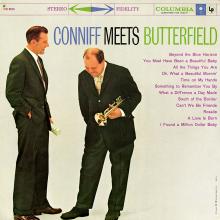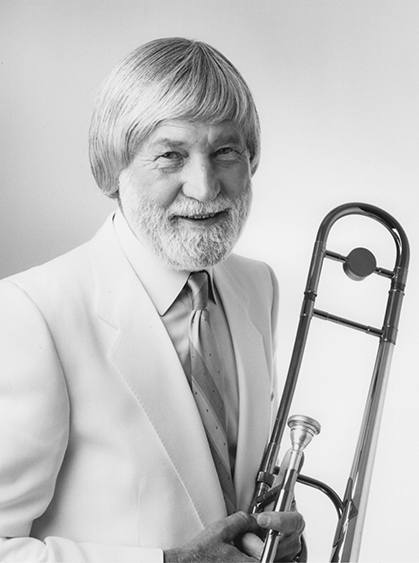Conniff Meets Butterfield
About This Album
This album was originally released in 1959 and reissued on CD in the USA in 1989 (Columbia CK 8155). On the U.S. reissue, the missing first beat on "South Of The Border" is annoying but otherwise it is a great CD. Sony deleted the CD in 1995. In Brazil this CD was titled 's Differentand does not contain the flaw in "South Of The Border."
Liner notes
The initials BB. What do they mean to you?
If, quick-as-a-wink, you say Billy Butterfield, and you're classified as masculine in gender, even our man Billy might suggest that you must either be obsequious or kidding.
Let's face it: Our Billy isn't in the same league with BB, the fabled Bardot of the French cinema. (He's older, that's why). And he's not in the same financial bracket with that "other" BB, Barney Baruch. (Hates those drafty old park benches.)
But if you're at all at ease in the jazz cosmos, the initials should quickly translate themselves subliminally and sublimely into the name of Billy Butterfield, the Brobdingnagian-toned trumpeter from Middletown, Ohio. And this album, in which Billy teams with arranger Ray Conniff, presents a full-sized demonstration of their brilliant musical talents.
Because Ray Conniff is a renowned musical innovator who specializes in crisp, fresh and intelligent sounds, and Billy Butterfield never sounded better, the pairing has produced an album that is, musically speaking, as easy and pleasing an alliance as similar musical ententes by Messrs. Rodgers and Hammerstein or Lerner and Loewe.
Actually, Conniff met Butterfield long before this recording session in New York City. These cats go back to the famous Bobcats of Bob Crosby, a little more than 20 years ago.
Born in Attleboro, Mass., Ray was taught to play trombone by his dad, who also taught him the rudiments of arranging, aided by a mail-order course. In 1936, after two years' gigging in and around Boston, Ray was added to the legendary Bunny Berigan band. And if you've been reading Hear Me Talkin' to Ya by Nat Shapiro and Nat Hentoff, you know what that group was like, musically and socially. How times have changed. Anyhow, it wasn't until Ray joined the Artie Shaw band that he came into his own as an arranger, turning out such precious baubles as, 'S Wonderful, and Prelude in C-sharp Minor. You still hear these numbers today. During his four-year hitch with Shaw, Ray could find time to study arranging at the Juilliard School of Music and fill in with radio shows. He joined the Harry James crew as an arranger no trombone after his World War II service.
Apart from his aptitude for sizzling big band arrangements, Ray also has a gift for orchestrating and conducting pop tunes for such performers as Johnnie Ray, Don Cherry, Guy Mitchell and Rosemary Clooney. Singin' the Blues, with Guy Mitchell, was a Conniff soundtrack that made a noise a few seasons back. (Ray also has recorded as a singer. And not bad, at that.)
Billy Butterfield's career is intertwined with that of Conniff's. He was a growing lad of about 20 when he came into prominence as Bob Crosby's "new" horn. His fame spread still farther when he and bass player Bobby Haggart wrote What's New. Like Ray, Billy also was a mighty cog in Artie Shaw's music machine and doubled as a member of the famous Gramercy Five. He followed this with a chair in Benny Goodman's band and, after serving in the armed forces, became one of the most sought-after sidemen in the land. This happy circumstance enabled Billy to pick and choose his own spots, and he preferred to play for the radio bands in New York. After being prevailed upon once again to travel this time with his own band Billy came back to New York and settled down to being one of jazzdom's most renowned hornmen, thanks to that wide-open tone, a no-nonsense sound that is undiluted by watery voices that have trickled into the trumpet bells of some less gifted musicians.
The album you are looking at contains a dozen superb tunes, all brought up to date with Billy's tastefully sophisticated and, when needed, hard-driving jazz. Billy Butterfield, his embouchure and trumpet carry the ball in this set. And what a ball he's having. His rugged, he-man tones and Conniff's glass-smooth, swinging-sweet arrangements do more than rustle the ear lobes that are, happily, within listening range. These sounds go beyond the finger-snapping and toe-tapping bit. For these lads, the snapping-tapping stage is just a starting point. They prefer to get heads and shoulders a-pumping, too, in the best therapeutic manner.
And that brings us to the purpose of this album. Conniff Meets Butterfield to Swing, Man. They have latched on the perennially popular custom of up-dating standard tunes. Now, they're doing it with a beat that bounces along in a simplified rhythmic pattern while the horn up front cuts loose with the melody. Result: a clean-cut, clean-swinging statement of music that is refreshingly free of complexity and gets down to the swingin' mood with great alacrity.
There is, however, one change of pace in the album. Billy does a piece of work on A Love Is Born (or Song of the Trumpet) that might just cause some lachrymal glands to lubricate an eyeball or two if you're not careful. This performance is worth the price of admission all alone. But there's much more, as Billy mixes humor and his unending supply of vitality to these standards.
In South of the Border, he comes on like a Boeing 707 and you can almost feel the heat as Billy pushes his way Tijuana-wards. Rosalie struts along with a new wiggle and a shuffling bounce in Billy's rendition. He gets maximum values out ofWhat a Diff'rence a Day Made as he uses a muted horn for the first go-'round and an open horn (and how!) the second time around. Oh, What a Beautiful Mornin' is delivered in a cheerful package that is faithful to the mood of the song. Filled with the happy spirit.
Something to Remember You By has Billy blowing more open, pretty sounds in a beautiful Schwartz-Dietz tune. There he is with a gentle-yet-jumping rendition of All the Things You Are. If you have a date around, here's a tip: Light's out. And listen to the way Butterfield belts those words, "... some DAY ..." near the finish.
Beyond the Blue Horizon features a rollicking rhythm section that spanks the melody forward, ever forward, with Billy playing muted horn and then adding some open horn embellishments. Time on My Hands offers softness, tenderness, in displaying more of Billy's mastery. Buddy Weed on piano gives him perfect support. Straight and slow is the way Million Dollar Babycomes across. Ideal for dancing, as is You Must Have Been a Beautiful Baby. Billy gives Can't We Be Friends a perky, humor-laced reading that adds to the fun in this jaunty album.
Notes by Fred Danzig

